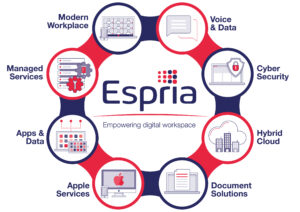Environmental, social, and governance (ESG) issues and strategies flood headlines daily, particularly sustainability issues. As we continue to innovate technology, we see how much more we can help the environment than was previously possible. As a result, the biggest culprits for polluting the environment – companies with a large carbon footprint – are being held accountable and the IT industry is no exception. Businesses must go beyond ‘greenwashing’ and ensure that their practices are truly sustainable to limit their impact on the planet.
We see an increase in requirements from the Government, stakeholders, employees, and consumers to comply with regulations and to do our part in the fight against climate change, all while ensuring our bottom line doesn’t waver.
The speed at which these innovations and requirements occur can deter leaders in business from switching to more sustainable business solutions. Overwhelmed and facing paralysis by analysis, they fail to keep up and fall behind competitors. ESG has now become a competitive component of business strategy. ESG-focused institutional investments will climb to 84% in 2026, reinforcing that investors, consumers, and employees have a sharp eye on business sustainability practices, especially within the technology sector. Private equity backed businesses can also expect to benefit from ESG programme implementation, with 50% citing better investment performance as a key reason to incorporate ESG.
Additionally, consumers are 88% more loyal to companies that support ESG practices, and 71% of employees and employment seekers find businesses with a sustainable focus more attractive. The bottom line is that implementing sustainable practices will lead to higher retention of employees, increased investment, and the attraction of top talent to businesses.

With this shift in focus, nearly 70% of CEOs plan to invest in new sustainable products or make current products more sustainable. In 2023, the tech industry will move faster on climate action than non-tech industries, with 73% of Tech C-suite executives hoping to reach net zero by 2030. The tech industry – unsurprisingly – is 40% more likely to take climate action versus a predicted 34% in other sectors. With technology being a primary driver in our ability to fight climate change and reduce carbon footprints, it is instinctive that our industry leads this action. As technology evolves, so should our ability and willingness to do more. No business has discovered a foolproof strategy to get it right 100% of the time, but a desire to educate yourself and the company on new technologies makes a difference.
When asking business leaders what technologies organisations were investing in to initiate sustainability – 19% stated digital and IT solutions. Businesses are now indicating they are looking to make investments by switching to more sustainable IT solutions. Sustainable solutions are now integral to the core tech stack. If your company has not invested in sustainable solutions, it will leave the business disadvantaged against competitors.
Even with persuasive statistics, there is a looming concern many business decision-makers have with implementing sustainable practices – the potential of additional costs. Leading some to believe it is counterintuitive for business growth – which isn’t the case.
According to a Gartner report, 4 out of 5 leaders see sustainability optimising and reducing costs, and 83% indicated sustainability programmes created both long and short-term value for their organisation. Value can take many forms; whether it increases your topline growth, mitigates risk for your company, or aids in an overall increase in productivity, these values are indispensable for effective business practices.
Businesses can implement sustainability within their business model by shifting to cloud computing, which according to Microsoft Corp., is 93% more energy-efficient than on-premise data centres. Businesses can refine current digital transformation strategies to ensure digitalisation wherever possible to reduce paper waste. Or even something as small as purchasing refurbished hardware, which allows for buying products in a new or like-new condition that can sell for 30 to 50 per cent of the price – without sacrificing quality. Leaders can also ensure partners have the same vision as the business regarding sustainable interest and action, allowing you to build your sustainable product offering to customers.
Remaining competitive in today’s market is an uphill battle for businesses. One of the most significant ways to showcase a competitive edge is by prioritising a sustainable business model and continually improving technological advancements. As business leaders, it should be a priority to encourage a more sustainable business culture by conducting research and educating ourselves on the implications of our current business standings. Espria has successfully utilised sustainability assessment tools to inform our next steps and those of our customers. We must invest in the changes we want to see, because not only is sustainability crucial for preserving our planet, but it is crucial for preserving your business’s success.
Learn more about our environmental, social and governance journey by reading our guide below:

